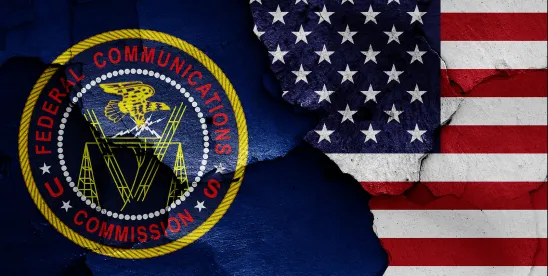The Federal Communications Commission (“FCC”) recently adopted a Notice of Proposed Rulemaking (“NPRM”) proposing changes to the FCC’s equipment authorization process to promote national security and strengthen the U.S. communications supply chain. Before being marketed in or imported to the U.S., all communications equipment must comply with the FCC’s equipment authorization procedures. The FCC has delegated authority to Telecommunications Certification Bodies (“TCBs”) and measurement facilities (also known as “Test Labs”) to carry out certain testing as part of its equipment authorization framework. In particular, TCBs are responsible for reviewing and evaluating applications for equipment certification, while Test Labs perform the required equipment testing and provide that data to TCBs and the FCC. In the NPRM, the FCC proposes to prevent TCBs and Test Labs with known national security risks from participating in the FCC’s equipment authorization program. Below is an overview of the FCC’s proposals.
First, the FCC proposes to restrict the entities that may serve as TCBs and Test Labs. In particular, it proposes to permanently prohibit TCBs and Test Labs from recognition or participation in the FCC’s equipment authorization process if an entity on the Covered List has a direct or indirect ownership interest of 10% or more or a controlling interest in the TCB or Test Lab. The prohibition would apply to participation in both the certification and Supplier’s Declaration of Conformity (“SDoC”) equipment approval procedures.
Second, the FCC seeks comment on whether and to what extent it should apply the proposed prohibition to TCBs or Test Labs owned or controlled by entities on other Executive Branch lists that identify companies posing national security concerns, including lists developed by the Departments of Commerce, Defense, and Treasury. The FCC also seeks comment on whether there are other types of ownership or control, beyond the Covered List determinations, that could affect the trustworthiness of a TCB or Test Lab and undermine public confidence.
Third, to improve its oversight of the equipment authorization program, the FCC proposes to require TCBs and Test Labs to report each direct or indirect equity or voting interest in the TCB or Test Lab of 5% or greater. The FCC asks whether it should distinguish between foreign private ownership and foreign governmental ownership and whether it should adopt additional reporting requirements for changes in ownership over a certain threshold.
Finally, the FCC proposes several additional revisions to its equipment authorization rules for TCBs and Test Labs, including whether the processes by which it recognizes a TCB following initial accreditation should include a further review by the FCC to determine if a TCB can meet its regulatory obligations and whether it should require all equipment authorized by the SDoC procedures – under which a party responsible for a device is only required to provide a test report and any other information requested by the FCC – to also be tested by an accredited and recognized Test Lab that meets the requirements of proposals provided in this proceeding.
If implemented, the FCC’s 5% or greater reporting threshold proposal signals a trend of increasing entities’ reportable foreign ownership. The FCC’s proposals could also significantly impact the communications supply chain by extending the amount of time it takes for equipment to be approved under the FCC’s procedures and limiting the number of accredited TCBs and Test Labs. Likewise, requiring equipment under the SDoC process to be formally tested before being sold could increase the costs of devices, such as computer peripherals (like wireless mice and keyboards), LED light bulbs, television remotes, certain wristwatches, electric power tools, and many small kitchen appliances.
Comments and reply comments on the NPRM are due 60 days and 90 days, respectively, after publication in the Federal Register, which has not yet occurred.





 />i
/>i

